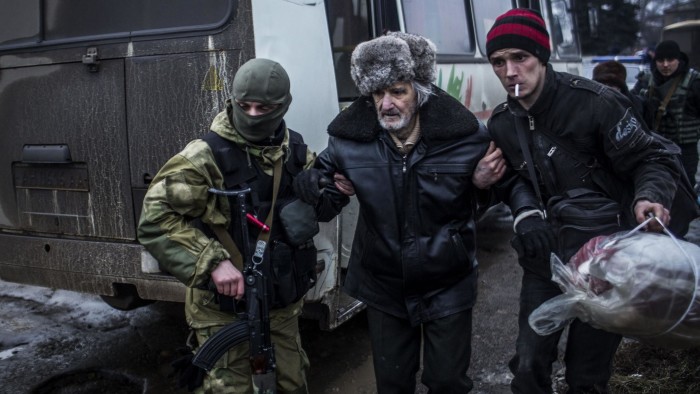Q&A: Neil Buckley answers your questions on Ukraine

Roula Khalaf, Editor of the FT, selects her favourite stories in this weekly newsletter.
How would you assess claims of corruption in Petro Poroshenko’s government and how would it affect the German/western attitude regarding a solution to the Ukraine crisis? — Frank Esmann, Denmark
There is no question that Ukraine has been one of Europe’s most corrupt countries in the past two decades. The current government’s hopes of pushing through structural reforms to tackle that corruption have been undermined by having to deal simultaneously with war and Russian intervention in its eastern regions. Western governments and the International Monetary Fund have made commitment to reform a central condition of further financial support. But David Lipton, the IMF’s first deputy managing director, told the FT recently: “This is the most reform-oriented government that I have encountered in 20-plus years of dealing with Ukraine.” Western governments and institutions are, therefore, inclined to support Kiev. They believe that if the conflict can be resolved, the current government has the best chance yet of turning Ukraine into a more prosperous and well-governed country.
Read the full series
The Battle for Ukraine

The Minsk moment
How Poroshenko’s diplomatic success unravelled
Russia’s rap sheet against the west
Putin’s list of complaints including Nato enlargement
German business’s change of tune
Flight’s fate saw business give unwavering support to a second round of action
Timeline
How the crisis in Ukraine unfolded
Can you suggest economic and political levers the west can use that will represent powerful and credible deterrents to dissuade Russia from backing further offensives into Ukraine and maybe even reversing the aggression? What is your view on the effectiveness of the current sanctions? — Bohdan Krucko, Toronto
Assessing the effectiveness of current sanctions is difficult, since we cannot be sure what Russian President Vladimir Putin might have done if they were not in place. Many western diplomats believe they may have deterred Russia from giving more extensive and overt support to separatists in the east which could have allowed them to push further into Ukraine. Additional economic levers could include extending existing sanctions on certain banks and oil groups to even more companies, making them genuinely sector-wide. But the signs are that there is not the necessary consensus for doing that in the EU, or for moving to tougher measures such as suspending Russia from the Swift international bank payment system.
Why is Donetsk airport so important in this war? Rebels or Russians could not possibly believe it will be functioning after all the distractions. — Inna Shishkova
Donetsk airport became a hugely symbolic target for both sides.
For Ukrainian forces, it has become a symbol of resistance to rebel control of the city. The Ukrainian army and government likened it to a mini “Stalingrad”, the battle that halted the Nazi offensive in Russia in the second world war. For the rebels, while the terminal was destroyed, it would be possible to repair the runway to provide an important means of receiving supplies, both military and economic, from Russia. Rebel control of the airport could, under any renewal or revision of last September’s Minsk ceasefire accord, force Ukrainian forces to withdraw a significant distance from Donetsk city. The airport is also close to the Avdiivka coke plant, a vital supplier to Ukraine’s steel industry and important economic target.
The assumption that the west is standing by in Ukraine is just accepted as fact, as are all the accusations [about] Russia from western diplomats. Why? — Harald Buchmann, Beijing
This is based largely on our on-the-ground reporting. Since the crisis broke out, the FT has sent seven different reporters to eastern Ukraine, all experienced Russian-speakers, some on multiple occasions. Some of those reporters have met and interviewed regular Russian soldiers in the occupied regions; they have seen Russian weapons in use by the rebels that were not part of Ukraine’s arsenal so could not have been seized from Ukrainian bases. We have not seen any evidence of direct intervention or involvement by western forces. Contrary to Moscow’s claims that last February’s overthrow of President Viktor Yanukovich was a “US-backed coup”, moreover, our reporters saw no evidence of US involvement — and the event was not a “coup” — although some pro-democracy NGOs involved in the Maidan protests in Kiev received some US funding.
Does the west have enough resources to deal with Russia appropriately, or does the apparent focus on radical Islam have an effect on its capabilities and efforts? — László Sándor, PhD student in economics, Harvard University
The rise of Isis, and of radical Islam more broadly, is undoubtedly a very significant threat, and is therefore a drag on the west’s capabilities and resources, distracting attention from Ukraine. We know from our reporting for the “Battle for Ukraine” series that Washington was pushing hard for some kind of peace deal in eastern Ukraine last August, before the Nato summit in September, so that it could focus on Isis and the Middle East. We also know that much of the dinner discussion of Nato leaders was about radical Islam — and the danger of fighters returning home radicalised from the Middle East. The Charlie Hebdo attacks in Paris last month showed those concerns to be well founded.
Comments